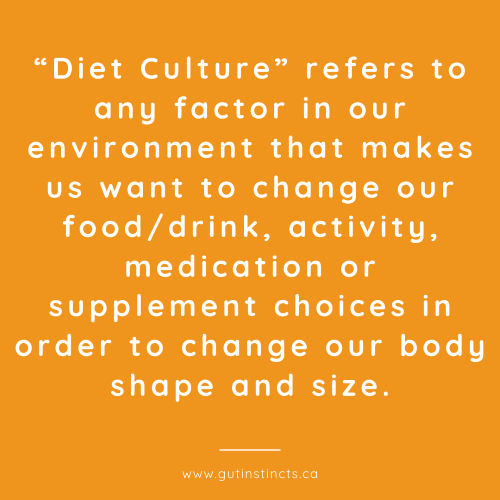|
Latest PostsShow All Recent PostsArchive
TagsEverything Intuitive Eating Weight Loss Health At Every Size (R) Health Kids Holiday Eating Halloween Eating Disorder Non-Diet Approach Food Relationship Emotional Eating |
Written By Suzanne Dietrich, RD & Carly Werner, RD
Whether we realize it or not, we are living in a culture full of messages about dieting and weight. Diet talk is so common that it probably feels normal, but it can be quite harmful and it is problematic.

Diet culture greatly increases the risk of disordered eating and eating disorders and puts people living in larger bodies at risk of experiencing fat stigma.
Unfortunately, there are many sources and they will be discussed in more detail in future posts.
It uses diet culture to sell their product. It loves to tell us that if only we weighed a little less, we would be happier and more successful.
Remember that this is a multibillion-dollar industry that is only successful if their products fail you.
Negative comments about weight gain at medical appointments during puberty or pregnancy are all part of diet culture. Be cautious of health care providers who claim to be on board with body positivity but also recommend avoiding sugar or starting a vegetarian diet for weight loss.
Weight loss is often recommended for disease prevention but thin people still get diabetes, heart disease, cancer, high blood pressure, and arthritis. Not to mention the damage that weight loss, dieting & weight cycling has on one's life mentally and physically (here). What we eat, how we move, sleep habits, stress, and genetics all influence our risk for disease. These factors guide our health regardless of what we weigh.
In addition, health is mainly determined by income level, gender, access to food, safe housing, healthcare and a variety of other factors that have LITTLE to do with our personal choices. Labeling people based on size prevents them from accessing proper health care and increases their risk of facing social and financial discrimination (see here).
Pursuits such as “lifestyle or wellness” can be kind of a lot like a diet if it is for the sake of changing your body or weight. You need to do what feels best for you, and that likely will change over your lifespan. If you are looking for a different way to treat your body without all the rules and shame then reach out. We can help you wade through all of these confusing messages and figure out what health looks like for you if that is what you are looking for.
|
|
|
|
|
|
We are a proud member of